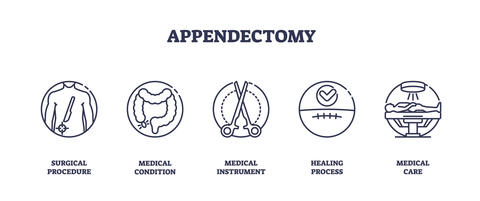Appendectomy promotes maintenance of remission in ulcerative colitis
ACCURE Study Group, Lancet Gastroenterol Hepatol. 2025;10(6):550-561
In a randomized trial including patients with ulcerative colitis in remission, a combination of appendectomy plus medical maintenance therapy resulted in a significantly lower frequency of disease flares within 1 year as compared to maintenance therapy alone.
Background: The appendix might have an immunomodulatory role in ulcerative colitis. Appendicectomy has been suggested as a potentially therapeutic intervention to maintain remission in ulcerative colitis. The aim of this trial was to evaluate the clinical effectiveness of laparoscopic appendicectomy in maintaining remission in patients with ulcerative colitis.
Methods: The authors did a pragmatic, open-label, international, randomised controlled superiority trial in 22 centres across the Netherlands, Ireland, and the UK. Patients with established ulcerative colitis who were in remission but had been treated for disease relapse within the preceding 12 months were randomly assigned (1:1) to undergo appendicectomy plus continued maintenance medical therapy (intervention group) or to continue maintenance medical therapy alone (control group). Randomisation was done with a central, computer-generated allocation concealment, stratified by disease extent. Patients and treating physicians were unmasked to group allocation. The prespecified primary outcome was the proportion of patients with a disease relapse within 1 year, predefined as a total Mayo score of 5 or higher with an endoscopic subscore of 2 or 3, or, in absence of endoscopy, based on a centrally independent masked review by a critical event committee as an exacerbation of abdominal symptoms (e.g., elevated stool frequency subscore of ≥ 1 point from baseline) with a rectal bleeding subscore of ≥ 1 or faecal calprotectin level above 150 μg/g or necessitating treatment intensification other than mesalazine. Analyses were done on an intention-to-treat principle.

Findings: Between September 20, 2012, and September 21, 2022, 1386 patients were screened. 201 patients were randomly assigned to the appendicectomy group (n = 101) or the control group (n = 100). After exclusion of 4 patients due to eligibility violations (3 had active disease and 1 received biological agents at time of randomisation), 99 patients in the appendicectomy group and 98 patients in the control group were included in the intention-to-treat analyses. The 1-year relapse rate was significantly lower in the appendicectomy group than in the control group (36/99 patients [36%] vs. 55/98 patients [56%]; relative risk = 0.65 [95% confidence interval: 0.47–0.89]; p = 0.005; adjusted p = 0.002). Adverse events occurred in 11 of 96 patients (11%) in the appendicectomy group and 10 of 101 patients (10%) in the control group. The most frequently reported adverse events were postoperative temporary self-limiting abdominal pain in the appendicectomy group (3 patients [3%]) and skin rash in the control group (3 patients [3%]). Two cases (2%) of low-grade appendiceal mucinous neoplasm were incidentally found in resected appendix specimens in the appendicectomy group. Serious adverse events occurred in 2 of 96 patients (2%) who underwent appendicectomy and none in the control group. There were no deaths.
Interpretation: Appendicectomy is superior to standard medical therapy alone in maintaining remission in patients with ulcerative colitis.